 W
WThe counterculture of the 1960s was an anti-establishment cultural phenomenon that developed throughout much of the Western world between the mid-1960s and the mid-1970s. The aggregate movement gained momentum as the U.S. Civil Rights Movement continued to grow, and, with the expansion of the American Government's extensive military intervention in Vietnam, would later become revolutionary to some. As the 1960s progressed, widespread social tensions also developed concerning other issues, and tended to flow along generational lines regarding human sexuality, women's rights, traditional modes of authority, experimentation with psychoactive drugs, and differing interpretations of the American Dream. Many key movements related to these issues were born or advanced within the counterculture of the 1960s.
 W
WThe Acid Tests were a series of parties held by author Ken Kesey primarily in the San Francisco Bay Area during the mid-1960s, centered on the use of and advocacy for the psychedelic drug LSD, commonly known as "acid". LSD was not made illegal in California until October 6, 1966.
 W
WThe Berkeley Barb was a weekly underground newspaper published in Berkeley, California, during the years 1965 to 1980. It was one of the first and most influential of the counterculture newspapers, covering such subjects as the anti-war movement and Civil Rights Movement, as well as the social changes advocated by youth culture.
 W
WThe Berkeley Tribe was a radical counterculture weekly underground newspaper published in Berkeley, California from 1969 to 1972. It was formed after a bitter staff dispute with publisher Max Scherr and split the nationally known Berkeley Barb into new competing underground weeklies. In July 1969 some 40 editorial and production staff with the Barb went on strike for three weeks, then started publishing the Berkeley Tribe as a rival paper, after first printing an interim issue called Barb on Strike to discuss the strike issues with the readership. They incorporated as Red Mountain Tribe, named after Gallo's one gallon finger-ringed jug of cheap wine, Red Mountain. It became a leading publication of the New Left.
 W
WBlack Bear Ranch is an 80-acre intentional community located in Siskiyou County, California, about 25 miles from Forks of Salmon. It was founded in 1968, with the watchword "free land for free people". It has been considered by some participants and commentators to be one of the more radical examples of communal living/intentional communities that grew out of the counterculture of the 1960s.
 W
WThe Black Power movement was a social movement motivated by a desire for safety and self-sufficiency that was not available inside redlined African American neighborhoods. Black Power activists founded black-owned bookstores, food cooperatives, farms, media, printing presses, schools, clinics and ambulance services. The international impact of the movement includes the Black Power Revolution in Trinidad and Tobago.
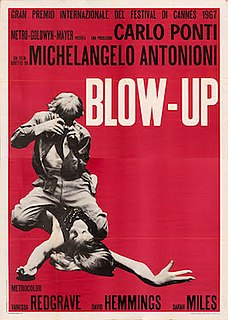 W
WBlowup is a 1966 mystery thriller film directed by Michelangelo Antonioni and produced by Carlo Ponti. It was Antonioni's first entirely English-language film, and stars David Hemmings as a London fashion photographer who believes he has unwittingly captured a murder on film. The film also stars Vanessa Redgrave, Sarah Miles, John Castle, Jane Birkin, Tsai Chin, Peter Bowles, and Gillian Hills, as well as 1960s model Veruschka. The film's plot was inspired by Julio Cortázar's short story "Las babas del diablo" (1959). The screenplay was by Antonioni and Tonino Guerra, with English dialogue by British playwright Edward Bond. The cinematographer was Carlo di Palma. The film's non-diegetic music was scored by jazz pianist Herbie Hancock, while rock group the Yardbirds also feature. The film is set within the mod subculture of 1960s Swinging London.
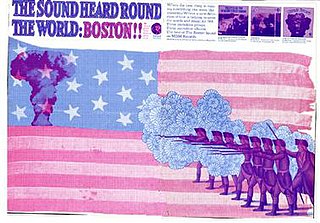 W
WThe Bosstown Sound was the catchphrase of a marketing campaign to promote psychedelic rock and psychedelic pop bands in Boston, Massachusetts, in the late 1960s. The concept was conceived by the record producer Alan Lorber as a marketing strategy intended to establish several underground musical artists native to the city on the national charts and compete with the popular San Francisco Sound. Lorber chose Boston for his plan because of the several bands developing in the city, the abundance of music venues, and the proximity of MGM Records, which had signed the core groups.
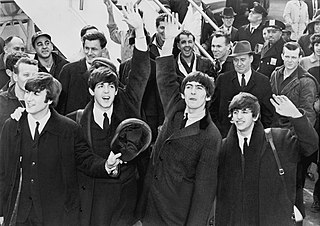 W
WThe British Invasion was a cultural phenomenon of the mid-1960s, when rock and pop music acts from the United Kingdom and other aspects of British culture became popular in the United States and significant to the rising "counterculture" on both sides of the Atlantic Ocean. Pop and rock groups such as the Beatles, the Rolling Stones, the Zombies, the Kinks, the Dave Clark Five, Herman's Hermits, the Hollies, the Animals, Gerry and the Pacemakers, the Searchers, the Yardbirds and the Who, as well as solo singers like Dusty Springfield, Cilla Black, Petula Clark, Tom Jones, and Donovan, were at the forefront of the "invasion". "British Invasion" is, however, more accurate in terms of the popularity of these British acts in the USA rather than as a description of the acts per se; the Beatles, for example, were a British band who became part of the "British invasion".
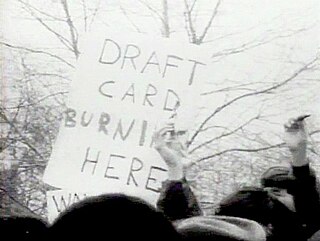 W
WDraft-card burning was a symbol of protest performed by thousands of young men in the United States and Australia in the 1960s and early 1970s. The first draft-card burners were American men taking part in the opposition to United States involvement in the Vietnam War. The first well-publicized protest was in December 1963, with a 22-year old conscientious objector, Eugene Keyes, setting fire to his card on Christmas Day in Champaign, Illinois. In May 1964, a larger demonstration, with about 50 people in Union Square, New York, was organized by the War Resisters League chaired by David McReynolds.
 W
WEarth Day is an annual event on April 22 to demonstrate support for environmental protection. First held on April 22, 1970, it now includes a wide range of events coordinated globally by EarthDay.org including 1 billion people in more than 193 countries.
 W
WThe East Village Other was an American underground newspaper in New York City, issued biweekly during the 1960s. It was described by The New York Times as "a New York newspaper so countercultural that it made The Village Voice look like a church circular."
 W
WFlower child originated as a synonym for hippie, especially among the idealistic young people who gathered in San Francisco and the surrounding area during the Summer of Love in 1967. It was the custom of "flower children" to wear and distribute flowers or floral-themed decorations to symbolize ideals of universal belonging, peace, and love. The mass media picked up on the term and used it to refer in a broad sense to any hippie. Flower children were also associated with the flower power political movement, which originated in ideas written by Allen Ginsberg in 1965.
 W
WFlower power was a slogan used during the late 1960s and early 1970s as a symbol of passive resistance and nonviolence. It is rooted in the opposition movement to the Vietnam War. The expression was coined by the American Beat poet Allen Ginsberg in 1965 as a means to transform war protests into peaceful affirmative spectacles. Hippies embraced the symbolism by dressing in clothing with embroidered flowers and vibrant colors, wearing flowers in their hair, and distributing flowers to the public, becoming known as flower children. The term later became generalized as a modern reference to the hippie movement and the so-called counterculture of drugs, psychedelic music, psychedelic art and social permissiveness.
 W
WJane Seymour Fonda is an American actress, political activist, environmentalist, and former fashion model. She is the recipient of various accolades including two Academy Awards, two British Academy Film Awards, seven Golden Globe Awards, a Primetime Emmy Award, the AFI Life Achievement Award, the Golden Lion Honorary Award, the Honorary Palme d'Or, and the Cecil B. DeMille Award.
 W
WThe Free Speech Movement (FSM) was a massive, long-lasting student protest which took place during the 1964–65 academic year on the campus of the University of California, Berkeley. The Movement was informally under the central leadership of Berkeley graduate student Mario Savio. Other student leaders include Jack Weinberg, Michael Rossman, George Barton, Brian Turner, Bettina Aptheker, Steve Weissman, Michael Teal, Art Goldberg, Jackie Goldberg and others.
 W
WJean Genet was a French novelist, playwright, poet, essayist, and political activist. In his early life he was a vagabond and petty criminal, but he later became a writer and playwright. His major works include the novels The Thief's Journal and Our Lady of the Flowers and the plays The Balcony, The Maids and The Screens.
 W
WWilliam Ford Gibson is an American-Canadian speculative fiction writer and essayist widely credited with pioneering the science fiction subgenre known as cyberpunk. Beginning his writing career in the late 1970s, his early works were noir, near-future stories that explored the effects of technology, cybernetics, and computer networks on humans—a "combination of lowlife and high tech"—and helped to create an iconography for the information age before the ubiquity of the Internet in the 1990s. Gibson coined the term "cyberspace" for "widespread, interconnected digital technology" in his short story "Burning Chrome" (1982), and later popularized the concept in his acclaimed debut novel Neuromancer (1984). These early works of Gibson's have been credited with "renovating" science fiction literature in the 1980s.
 W
WGreenwich Village is a neighborhood on the west side of Lower Manhattan in New York City, bounded by 14th Street to the north, Broadway to the east, Houston Street to the south, and the Hudson River to the west. Greenwich Village also contains several subsections, including the West Village west of Seventh Avenue and the Meatpacking District in the northwest corner of Greenwich Village.
 W
WHair: The American Tribal Love-Rock Musical is a rock musical with a book and lyrics by Gerome Ragni and James Rado and music by Galt MacDermot. The work reflects the creators' observations of the hippie counterculture and sexual revolution of the late 1960s, and several of its songs became anthems of the anti-Vietnam War peace movement. The musical's profanity, its depiction of the use of illegal drugs, its treatment of sexuality, its irreverence for the American flag, and its nude scene caused much comment and controversy. The musical broke new ground in musical theatre by defining the genre of "rock musical", using a racially integrated cast, and inviting the audience onstage for a "Be-In" finale.
 W
WA hippie, also spelled as hippy, was a member of the counterculture of the 1960s, originally a youth movement that began in the United States during the mid-1960s and spread to other countries around the world. The word hippie came from hipster and was used to describe beatniks who moved into New York City's Greenwich Village, San Francisco's Haight-Ashbury district, and Chicago's Old Town community. The term hippie was used in print by San Francisco writer Michael Fallon, helping popularise use of the term in the media, although the tag was seen elsewhere earlier.
 W
WThe Isle of Wight Festival is a British music festival which takes place annually in Newport on the Isle of Wight, England. It was originally a counterculture event held from 1968 to 1970.
 W
WIn 1968 and 1969, there were student protests at several Japanese universities that ultimately forced the closure of campuses nationwide. Known as daigaku funsō or daigaku tōsō, the protests were part of the worldwide protest cycle in 1968 and the late-1960s Japanese protest cycle, including the Anpo protests of 1970 and the struggle against the construction of Narita Airport. Students initially demonstrated against practical issues in universities, and they eventually formed the Zenkyōtō in mid-1968 to organize themselves. The protests were dispersed in 1969 by the Act on Temporary Measures concerning University Management.
 W
WKPFA is an American listener-funded talk radio and music radio station located in Berkeley, California, broadcasting to the San Francisco Bay Area. KPFA airs public news, public affairs, talk, and music programming. The station signed on-the-air April 15, 1949, as the first Pacifica Radio station and remains the flagship station of the Pacifica Radio Network.
 W
WLaurel Canyon is a mountainous neighborhood in the Hollywood Hills region of the Santa Monica Mountains, within the Hollywood Hills West district of Los Angeles, California. The main thoroughfare of Laurel Canyon Boulevard connects the neighborhood with the more urbanized parts of Los Angeles to the north and south, between Ventura Boulevard and Hollywood Boulevard.
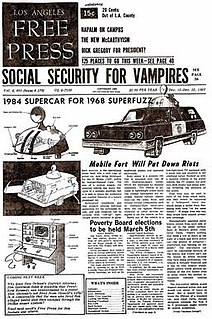 W
WThe Los Angeles Free Press, also called "The Freep", is often cited as the first, and certainly was the largest, of the underground newspapers of the 1960s.
 W
WLysergic acid diethylamide (LSD), also known colloquially as acid, is a psychedelic drug. Effects typically include intensified thoughts, emotions, and sensory perception. At sufficiently high dosages LSD manifests primarily visual, as well as auditory, hallucinations. Dilated pupils, increased blood pressure, and increased body temperature are typical. Since LSD binds to dopamine receptors in addition to serotonin receptors its effects are also more energetic and fast paced compared to psychedelics such as psilocybin, which is not a dopamine agonist. Effects typically begin within half an hour and can last for up to 20 hours. LSD is also capable of occasioning mystical experiences and ego disillusion, albeit less frequently than compounds such as psilocybin. It is used mainly as a recreational drug or for spiritual reasons. LSD is both the prototypical psychedelic and one of the 'classical' psychedelics, being the psychedelics with the greatest scientific and cultural significance.
 W
WMánička is a Czech term used for young people with long hair, typically men, in Czechoslovakia through the 1960s and 1970s. Long hair for males during this time was considered an expression of political and social attitudes in communist Czechoslovakia.
 W
WPhilip David Ochs was an American protest singer and songwriter who was known for his sharp wit, sardonic humor, political activism, often alliterative lyrics, and distinctive voice. He wrote hundreds of songs in the 1960s and 1970s and released eight albums.
 W
WOz was an independently published, alternative/underground magazine associated with the international counterculture of the 1960s. While it was first published in Sydney in 1963, a parallel version of Oz was published in London from 1967. The Australian magazine was published until 1969 and the British version until 1973.
 W
WA peace movement is a social movement that seeks to achieve ideals such as the ending of a particular war or wars, minimize inter-human violence in a particular place or type of situation, and is often linked to the goal of achieving world peace. The means to achieve these ends include advocacy of pacifism, non-violent resistance, diplomacy, boycotts, peace camps, moral purchasing, supporting anti-war political candidates, legislation to remove the profit from government contracts to the military–industrial complex, banning guns, creating open government and transparency tools, direct democracy, supporting whistleblowers who expose war crimes or conspiracies to create wars, demonstrations, and national political lobbying groups to create legislation. The political cooperative is an example of an organization that seeks to merge all peace movement organizations and green organizations, which may have some diverse goals, but all of whom have the common goal of peace and humane sustainability. A concern of some peace activists is the challenge of attaining peace when those that oppose it often use violence as their means of communication and empowerment.
 W
WProgg was a left-wing and anti-commercial musical movement in Sweden that began in the late 1960s and became more widespread in the 1970s. Not to be confused with the English expressions "progressive music" or "prog rock," progg is a contraction of the Swedish word for musical progressivism, progressiv musik. While there were progg bands playing progressive rock, the progg movement encompassed many different musical genres.
 W
WThe protests of 1968 comprised a worldwide escalation of social conflicts, predominantly characterized by popular rebellions against state militaries and the bureaucracies.
 W
WRolling Stone is an American monthly magazine that focuses on music, politics, and popular culture. It was founded in San Francisco, California, in 1967 by Jann Wenner, and the music critic Ralph J. Gleason. It was first known for its coverage of rock music and for political reporting by Hunter S. Thompson. In the 1990s, the magazine broadened and shifted its focus to a younger readership interested in youth-oriented television shows, film actors, and popular music. It has since returned to its traditional mix of content, including music, entertainment, and politics.
 W
W"San Francisco " is an American pop music song, written by John Phillips, and sung by Scott McKenzie. It was produced and released in May 1967 by Phillips and Lou Adler, who used it to promote their Monterey International Pop Music Festival held in June of that year.
 W
WSan Francisco Express Times was a counterculture tabloid underground newspaper edited by Marvin Garson and published weekly in San Francisco, California from January 24, 1968, to March 25, 1969, for a total of 62 issues, covering and promoting radical politics, rock music, arts and progressive culture in the Bay Area. It was a member of the Underground Press Syndicate, and sold for 15 cents.
 W
WThe Oracle of the City of San Francisco, also known as the San Francisco Oracle, was an underground newspaper published in 12 issues from September 20, 1966, to February 1968 in the Haight-Ashbury neighborhood of that city. Allen Cohen (1940–2004), the editor during the paper's most vibrant period, and Michael Bowen, the art director, were among the founders of the publication. The Oracle was an early member of the Underground Press Syndicate.
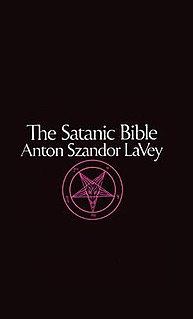 W
WThe Satanic Bible is a collection of essays, observations, and rituals published by Anton LaVey in 1969. It is the central religious text of LaVeyan Satanism, and is considered the foundation of its philosophy and dogma. It has been described as the most important document to influence contemporary Satanism. Though The Satanic Bible is not considered to be sacred scripture in the way that the Christian Bible is to Christianity, LaVeyan Satanists regard it as an authoritative text as it is a contemporary text that has attained for them scriptural status. It extols the virtues of exploring one's own nature and instincts. Believers have been described as "atheistic Satanists" because they believe that God and Satan are not external entities, but rather projections of an individual's own personality—benevolent and stabilizing forces in their life. There have been thirty printings of The Satanic Bible, selling over a million copies.
 W
WThe sexual revolution, also known as a time of sexual liberation, was a social movement that challenged traditional codes of behavior related to sexuality and interpersonal relationships throughout the United States and the developed world from the 1960s to the 1980s. Sexual liberation included increased acceptance of sex outside of traditional heterosexual, monogamous relationships. The normalization of contraception and the pill, public nudity, pornography, premarital sex, homosexuality, masturbation, alternative forms of sexuality, and the legalization of abortion all followed.
 W
WSteal This Book is a book written by Abbie Hoffman. Written in 1970 and published in 1971, the book exemplified the counterculture of the sixties. The book sold more than a quarter of a million copies between April and November 1971.
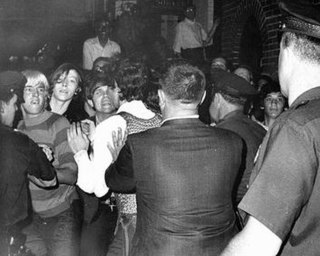 W
WThe Stonewall riots were a series of spontaneous demonstrations by members of the gay community in response to a police raid that began in the early morning hours of June 28, 1969, at the Stonewall Inn in the Greenwich Village neighborhood of New York City, New York, United States of America. Patrons of the Stonewall, other Village lesbian and gay bars, and neighborhood street people fought back when the police became violent. The riots are widely considered a watershed event that transformed the gay liberation movement and the twentieth-century fight for LGBT rights in the United States.
 W
WThe student strike of 1970 was a massive protest across the United States, that included walk-outs from college and high school classrooms initially in response to the United States expansion of the Vietnam War into Cambodia. The strike began May 1, but increased significantly after the shooting of students at Kent State University by National Guardsmen on May 4. While many violent incidents occurred during the protests, they were, for the most part, peaceful.
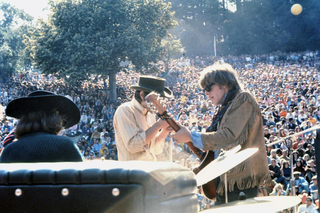 W
WThe Summer of Love was a social phenomenon that occurred during the summer of 1967, when as many as 100,000 people, mostly young people sporting hippie fashions of dress and behavior, converged in San Francisco's neighborhood of Haight-Ashbury. More broadly, the Summer of Love encompassed the hippie music, hallucinogenic drugs, anti-war, and free-love scene throughout the West Coast of the United States, and as far away as New York City.
 W
WThe Sunset Strip curfew riots, also known as the "hippie riots", were a series of early counterculture-era clashes that took place between police and young people on the Sunset Strip in West Hollywood, California in 1966.
 W
WThe Swinging Sixties was a youth-driven cultural revolution that took place in the United Kingdom during the mid-to-late 1960s, emphasising modernity and fun-loving hedonism, with Swinging London as its centre. It saw a flourishing in art, music and fashion, and was symbolised by the city's "pop and fashion exports". Among its key elements were the Beatles, as leaders of the British Invasion of musical acts; Mary Quant's miniskirt; popular fashion models such as Twiggy and Jean Shrimpton; the mod subculture; the iconic status of popular shopping areas such as London's King's Road, Kensington and Carnaby Street; the political activism of the anti-nuclear movement; and sexual liberation. Music was a big part of the scene, with "the London sound" including the Who, the Kinks, the Small Faces and the Rolling Stones, bands that were the mainstay of pirate radio stations like Radio Caroline and Swinging Radio England. Swinging London also reached British cinema, which, according to the British Film Institute, "saw a surge in formal experimentation, freedom of expression, colour, and comedy". During this period, "creative types of all kinds gravitated to the capital, from artists and writers to magazine publishers, photographers, advertisers, film-makers and product designers".
 W
WTeenSet was an American music and fan magazine published by Capitol Records. Beginning in 1964 as a free album insert for fans of the Beach Boys, the magazine was sold separately in 1965 and it grew in popularity. It was introduced as a vehicle to promote the Beach Boys and other Capitol artists, but in the hands of editor Judith Sims, the magazine broke new ground, rising above its fan club origin. Quickly establishing itself as the gateway to the inner circle of the Beatles at the height of Beatlemania, TeenSet parlayed this trust to introduce their readers to new artists, in the process greatly increasing the visibility of Buffalo Springfield, the Doors, Janis Joplin and the Mothers of Invention. The magazine benefited from articles by music critic Sue Cameron, London correspondent Carol Gold, psychedelic maverick Robert Shea, and photographs from Jim Marshall and Michael Ochs. It began as an early teen girls' magazine but by 1968 was shifting to focus on late teen girls and young women in their early twenties.
 W
WThe Family Dog Denver, was a concert dance hall located at 1601 West Evans Avenue in Denver, Colorado. Opened from September 1967 to July 1968, it is regarded as a seminal music venue that launched Denver on its trajectory to its current status as a major concert destination by introducing never-before-seen acts like The Doors, Van Morrison, Jimi Hendrix, Cream, Buffalo Springfield, Janis Joplin, Chuck Berry, and many others. Many acts, like The Doors and Van Morrison, for example, had yet to become famous when they played The Dog, evidenced by the poster artists having to stylize the names of their leading songs into the poster art for the shows. The Family Dog is also seen as a cultural turning point in Denver from the conservative, western-minded sensibility of the early and mid-20th century to the current, liberal-minded climate. The venue's history, surrounding drama and ultimate impact had been largely unknown and unrealized until it was unearthed and detailed for the first time in the 2021 documentary, The Tale of the Dog, produced and directed by Dan Obarski & Scott Montgomery and distributed by Cinedigm. As there are no useful photos, no video and little written history remaining of the Family Dog Denver, the film's oral history format told in first person by the people who were there serves as a definitive reference for “The Dog.”
 W
WThe British counter-culture or underground scene developed during the mid 1960s, and was linked to the hippie and subculture of the United States. Its primary focus was around Ladbroke Grove and Notting Hill in London. It generated its own magazines and newspapers, bands, clubs and alternative lifestyle, associated with cannabis and LSD use and a strong socio-political revolutionary agenda to create an alternative society.
 W
WUnderground comix are small press or self-published comic books that are often socially relevant or satirical in nature. They differ from mainstream comics in depicting content forbidden to mainstream publications by the Comics Code Authority, including explicit drug use, sexuality, and violence. They were most popular in the United States in the late 1960s and 1970s, and in the United Kingdom in the 1970s.
 W
WThe Underground Press Syndicate (UPS), later known as the Alternative Press Syndicate (APS), was a network of countercultural newspapers and magazines formed in mid-1966 by the publishers of five early underground papers: the East Village Other, the Los Angeles Free Press, the Berkeley Barb, The Paper, and Fifth Estate. As it evolved, the Underground Press Syndicate created an Underground Press Service, and later its own magazine. For many years the Underground Press Syndicate was run by Tom Forcade, who later founded High Times magazine.
 W
WVietnam War resisters in Canada were American draft evaders and military deserters who avoided serving in the Vietnam War by seeking political asylum in Canada between 1965 and 1975. According to scholar Valerie Knowles, opponents of the war who sought refuge in Canada were typically college-educated and middle class Americans who could no longer defer induction into the Selective Service System. Deserters were usually lower-income and working class who had been inducted into the United States Armed Forces right after high school or had later volunteered, hoping to obtain a skill and broaden their limited horizons.
 W
WWBAI, is a non-commercial, listener-supported radio station licensed to New York City. Its programming is a mixture of political news, talk and opinion from a left-leaning, liberal or progressive viewpoint, and eclectic music. The station is owned by the Pacifica Foundation with studios located in Brooklyn and transmitter located at 4 Times Square.
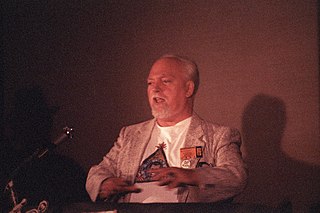 W
WRobert Anton Wilson was an American author, futurist, and self-described agnostic mystic. Recognized within Discordianism as an Episkopos, pope and saint, Wilson helped publicize Discordianism through his writings and interviews.
 W
WWoodstock Music and Art Fair, commonly referred to simply as Woodstock, was a music festival held August 15–18, 1969, on Max Yasgur's dairy farm in Bethel, New York, 40 miles (65 km) southwest of the town of Woodstock. Billed as "an Aquarian Exposition: 3 Days of Peace & Music" and alternatively referred to as the Woodstock Rock Festival, it attracted an audience of more than 400,000. Thirty-two acts performed outdoors despite sporadic rain.
 W
WThe Youth International Party (YIP), whose members were commonly called Yippies, was an American youth-oriented radical and countercultural revolutionary offshoot of the free speech and anti-war movements of the late 1960s. It was founded on December 31, 1967. They employed theatrical gestures to mock the social status quo, such as advancing a pig as a candidate for president of the United States in 1968. They have been described as a highly theatrical, anti-authoritarian and anarchist youth movement of "symbolic politics".
 W
WThe All-Campus Joint Struggle Committees, commonly known as the Zenkyōtō, were Japanese student organizations consisting of anti-government, anti-Japanese Communist Party leftist and non-sectarian radicals. The Zenkyōtō were formed to organize students during the 1968–69 Japanese university protests. Unlike other student movement organizations, graduate students and young teachers were allowed to participate. Active in the late 1960s, Zenkyōtō was the driving force behind clashes between Japanese students and the police. Zenkyōtō groups were driven by alienation and a reaction to "American imperialism", Japanese "Monopoly Capitalism", and "Russian Stalinism". However, many members of the movement were non-political, and were focused more on more practical and local problems. Much of the movement centered around nihilism, humanism and existentialism, which served as inspirations for revolution.